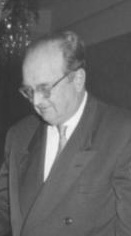Ethnologist, Americanist. Born in Hörste, Westphalia (Germany) 17 August 1900, died Mexico City (Mexico) 9 December 1972. Kirchhoff studied evangelical theology and religion in Berlin and Freiburg i. Br., and psychology and ethnology in Leipzig, where he also developed an interest in the native cultures of the Americas. In 1927, he completed his studies with a doctoral dissertation on the kinship organization of the South American Indians. In his dissertation, Kirchhoff developed typologies of kinship terminologies which preced those of George Peter Murdock [1897-1985] and are different from those developed at about the same time by Robert H. Lowie [1883-1957]. Until 1929 Kirchhoff served as a staff member of the Berlin Museum für Völkerkunde. In addition, he collaborated on different international research projects overseas. In 1939,
Kirchhoff was deprived of his German citizenship for political reasons, becoming a Mexican citizen in 1941. In Mexico he was employed at first by the Museo Nacional de Antropología and became in 1955 one of the co-founders of the Escuela Nacional de Antropología e Historia, which developped into the leading training center for anthropologists in Mexico. Kirchhoff was employed there until 1965 and at the same time held a professorship in the graduate division of anthropology at the Universidad Nacional Autónoma de México.
As a visiting lecturer, Kirchhoff lectured in 1960 and 1967 at the universities of Bonn, Heidelberg and Frankfurt am Main in Germany. 1963 saw the culmination of Kirchhoff's efforts to create scientific cooperation between Germany and Mexico in the founding of the interdisciplinary Puebla-Tlaxcala Project, sponsored bei the „Deutsche Forschungsgemeinschaft“, which lasted for more than twenty years, whose patron he had become and which was training ground for many anthropologists and archaeologists, among them Ursula Dyckerhoff [1930-2004], Peter Tschohl [1935-2007], Wolfgang Marschall [born 1937], Klaus Jäcklein [ born 1940], and Hanns J. Prem [born 1941].
Of the great number and diversity of Kirchhoff's researches, those on the Indians of North and South America and his archaeological and ethno-historical work on the little considered northern and northwestern regions of Mexico must be emphasized. His most influential contribution to research on the Americas is the creation of the culture-area concept of "Mesoamerica", wherein he was later challenged by Mexican born scholar Wigberto Jiménez Moreno [1909-1985], who purported to have developped the concept earlier, albeit he had not published it. The Mesoamerican culture area encompasses Indian civilizations of the contiguous zone covering the central and southern portions of Mexico, the adjoining countries Guatemala, El Salvador, and Belize in their entirety, the northwestern section of Honduras and the northern Pacific coast of Nicaragua. Kirchhoff defined this region as a culture area whose historical growth was interrelated, based upon common cultural characteristics such as ball courts, hieroglyphic writing and stepped pyramids.
(Text by courtesy of Berthold Riese; photo by courtesy of Siegfried Seyfarth)


